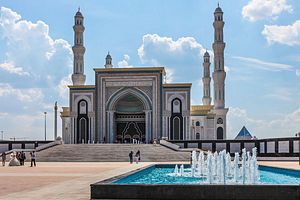It is an unfortunate reality that extremism and terrorism have become global threats affecting all corners of the world. There has been a fivefold increase in deaths from terrorism since September 11, 2001, with religious extremism overtaking national separatism as the main driver of attacks. It is why stamping out religious extremism has to be at the top of the global agenda.
This task must start with young people who have been deliberately targeted by the extremists. They frequently feature in the so-called Islamic State’s propaganda videos while Twitter and other social media outlets have also been used to increase their appeal to the younger generation. Tragically, these attempts have encouraged thousands of young individuals to travel to Iraq and Syria to join the terrorists.
But the threat from this warped ideology has not stopped within Iraq’s and Syria’s borders. Countries as far flung and different as the United States, Australia, Belgium, France, Germany, Afghanistan, Turkey, Saudi Arabia, Mali, Nigeria, along with many others, have been hit by radical Islamist extremists in the last year. Kazakhstan sadly also joined this list when extremists struck in Aktobe in June.
It was a stark wake-up call for our society that has prided itself on tolerance and inclusive growth since we gained our independence 25 years ago. Our response has been to strengthen our determination to preserve the secular nature of our country and its religious moderation while protecting the rights of religious believers and preventing and countering extremism through well-thought-through and balanced policies. It is for these reasons, as well as for the need to further develop our civil society as a key partner and ensure youth is properly included in our country’s progress, that Kazakh President Nursultan Nazarbayev has established the Ministry for Religious and Civil Society Affairs.
The new Ministry will play an important role in helping Kazakhstan continue along its development path and incorporate the global standards enshrined in the 100 Concrete Steps. This will be achieved through our three main responsibilities: ensuring the secularity of our state while protecting the interests of Kazakhstan’s religions and individual religious freedoms; strengthening civil society; and putting in place policies to help the development of young people within our country.
In the short- to medium-term, the Ministry will look to directly counter the threat of religious extremism through information and education. We will work with those who may already have been influenced by this warped ideology, as well as reconnecting disenfranchised groups back into Kazakhstan’s society through economic, employment, and cultural programs. This last initiative is especially important as the biggest recruiting tool for extremist groups is a feeling of disenfranchisement.
This gives us a special responsibility to make sure all our young people feel part of our society and can contribute, through their talents and energy, to achieving our country’s long-term goals. The Department of Youth Policy has been established within the Ministry, with regional branches in all local government bodies, which will be responsible for the Councils of Youth set up in every region. We also have almost 200 youth resource centers across the country to address the needs of our young people. We must make sure the younger generation, including students and the unemployed, feel they belong to Kazakhstan’s society and do not fall prey to extremist ideologies.
The Ministry has also been given the task of strengthening the development and role of Kazakhstan’s civil society within our country. This will build on the government grants already given to NGOs to help them develop and to support projects. There is a growing recognition worldwide – including by the UN and OSCE – of the importance of civil society in countering extremism and terrorism. For this reason, Kazakhstan has been improving its legal framework to encourage the development of civil society institutions based on the best foreign practices and standards. Our Ministry will build on this progress.
Kazakhstan, of course, has been actively involved in the global fight against violent extremism and terrorism, as well as taking a leading role in religious and ethnic harmony. But it is also essential that we step up these efforts at home. The establishment of the Ministry for Religious and Civil Society Affairs is an important move in this direction. Not only will it help to counter the influence of warped religious ideologies within our borders but it will also strengthen the role of our civil society, accelerate our nation building efforts and give all our young people a bright future and the chance to play their full role in the development of Kazakhstan.
Nurlan Yermekbayev is Minister for Religious and Civil Society Affairs of Kazakhstan.

































